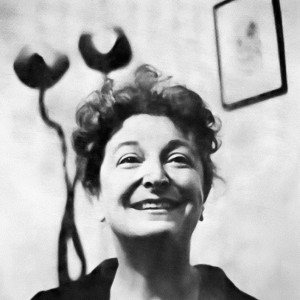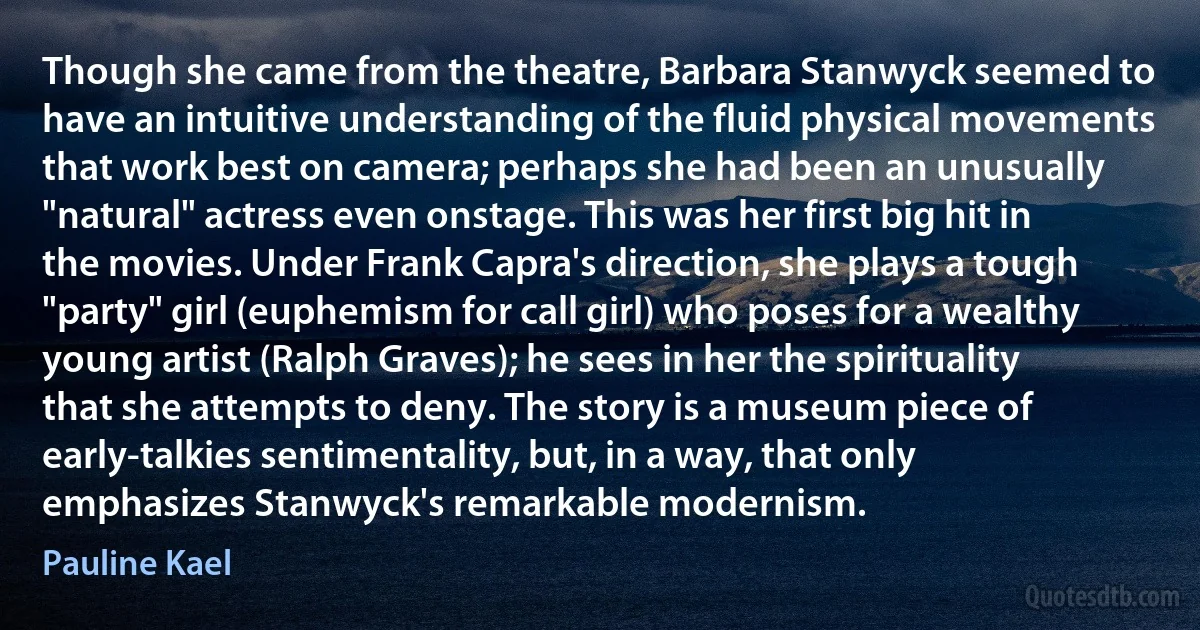Pauline Kael quotes - page 3
Pauline Kael was an influential American film critic, renowned for her passionate and incisive writing for The New Yorker. Her bold opinions and distinctive voice helped shape the standards of modern film criticism. She inspired generations of critics with her wit, insight, and fearless approach. Here are 76 of her quotes:
Movies make hash of the schoolmarm's approach of how well the artist fulfilled his intentions. Whatever the original intention of the writers and director, it is usually supplanted, as the production gets under way, by the intention to make money - and the industry judges the film by how well it fulfills that intention. But if you could see the "artist's intentions" you'd probably wish you couldn't anyway. Nothing is so deathly to enjoyment as the relentless march of a movie to fulfill its obvious purpose. This is, indeed, almost a defining characteristic of the hack director, as distinguished from an artist.

Pauline Kael
It would be very convincing to say that there's no hope for movies - that audiences have been so corrupted by television and have become so jaded that all they want are noisy thrills and dumb jokes and images that move along in an undemanding way, so they can sit and react at the simplest motor level. And there's plenty of evidence, such as the success of Alien. This was a haunted-house-with-gorilla picture set in outer space. It reached out, grabbed you, and squeezed your stomach; it was more gripping than entertaining, but a lot of people didn't mind. They thought it was terrific, because at least they'd felt something: they'd been brutalized. It was like an entertainment contrived in Aldous Huxley's Brave New World by the Professor of Feelies in the College of Emotional Engineering.

Pauline Kael
In movies, the balance between art and business has always been precarious, with business outweighing art, but the business was, at least, in the hands of businessmen who loved movies. As popular entertainment, movies need something of what the vulgarian moguls had - zest, a belief in their own instincts, a sentimental dedication to producing pictures that would make their country proud of their contribution, a respect for quality, and the biggest thing: a willingness to take chances. The cool managerial sharks don't have that; neither do the academics. But the vulgarians also did more than their share of damage, and they're gone forever anyway. They were part of a different America. They were, more often than not, men who paid only lip service to high ideals, while gouging everyone for profits. The big change in the country is reflected in the fact that people in the movie business no longer feel it necessary to talk about principles at all.

Pauline Kael
October 14, 1972: that date should become a landmark in movie history comparable to May 29, 1913 - the night Le Sacre du Printemps was first performed - in music history. There was no riot, and no one threw anything at the screen, but I think it's fair to say that the audience was in a state of shock, because Last Tango in Paris has the same kind of hypnotic excitement as the Sacre, the same primitive force, and the same thrusting, jabbing eroticism. [...] Bertolucci and Brando have altered the face of an art form. Who was prepared for that?

Pauline Kael
The conglomerate heads may be business geniuses, but as far as movies are concerned they have virgin instincts; ideas that are new to them and take them by storm may have failed grotesquely dozens of times. But they feel that they are creative people - how else could they have made so much money and be in a position to advise artists what to do? Who is to tell them no?

Pauline Kael
People have expected less of movies and have been willing to settle for less. Some have even been willing to settle for Kramer vs. Kramer and other pictures that seem to be made for an audience of over-age flower children. These pictures express the belief that if a man cares about anything besides being at home with the kids, he's corrupt. Parenting ennobles Dustin Hoffman and makes him a better person in every way, while in The Seduction of Joe Tynan we can see that Alan Alda is a weak, corruptible fellow because he wants to be President of the United States more than he wants to stay at home communing with his daughter about her adolescent miseries. Pictures like these should all end with the fathers and the children sitting at home watching TV together.

Pauline Kael
Unlike storybook heroes and heroines but like many actual heroes and heroines, she was something of a social outcast. (As Simone Weil noted, it was the people with irregular and embarrassing histories who were often the heroes of the Resistance in the Second World War; the proper middle-class people may have felt they had too much to lose.)

Pauline Kael
One's moviegoing tastes and habits change - I still like in movies what I always liked but now, for example, I really want documentaries. After all the years of stale stupid acted-out stories, with less and less for me in them, I am desperate to know something, desperate for facts, for information, for faces of non-actors and for knowledge of how people live - for revelations, not for the little bits of show-business detail worked up for us by show-business minds who got them from the same movies we're tired of.

Pauline Kael
A woman who taught at Berkeley dropped in on me once and saw a book burning in the fireplace. She pointed at it in terror, and I explained that it was a crummy ghostwritten life of a movie star and that it was an act of sanitation to burn it rather than sending it out into the world which was already clogged with too many copies of it. But she said, "You shouldn't burn books" and began to cry.

Pauline Kael
After one of those terrible lovers' quarrels that leave one in a state of incomprehensible despair. I came out of the theater, tears streaming, and overheard the petulant voice of a college girl complaining to her boyfriend, "Well I don't see what was so special about that movie." I walked up the street, crying blindly, no longer certain whether my tears were for the tragedy on the screen, the hopelessness I felt for myself, or the alienation I felt from those who could not experience the radiance of Shoeshine. For if people cannot feel Shoeshine, what can they feel?... Later I learned that the man with whom I had quarreled had gone the same night and had also emerged in tears. Yet our tears for each other, and for Shoeshine did not bring us together. Life, as Shoeshine demonstrates, is too complex for facile endings.

Pauline Kael
There is a dreadful discrepancy between Michelangelo's works and the words put into the mouth of Charlton Heston, who represents him here, and this picture - which is mostly about a prolonged wrangle between the sculptor and Pope Julius II (Rex Harrison), who keeps sweeping into the Sistine Chapel and barking, "When will you make an end of it?"

Pauline Kael
Hilariously florid - sometimes referred to as "Lust in the Dust." This Wagnerian western features Gregory Peck and Jennifer Jones as lovers so passionate they kill each other. She's Pearl Chavez, a half-breed wench, and so, by Hollywood convention, uncontrollably sexy, and Peck actually manages to bestir himself enough to play a hunk of egotistical hot stuff - maybe the name Lewt McCanles got to him, or maybe the producer, David O. Selznick, used electric prods. Peck clangs his spurs and leers, while Jones heaves her chest; when they kiss, lightning blazes.

Pauline Kael
Charles Laughton is superbly vulgar in this whack at the backside of Victorianism. He makes a great vaudeville turn out of the role of an egocentric scoundrel, the prosperous bootmaker who doesn't want to part with his three marriageable daughters because they are too useful as unpaid labor. As the oldest daughter, the spinster in spite of herself, Brenda de Banzie is so "right" that when she marries her father's best workman and puts belching, drunken old Dad out of business, one feels the good old-fashioned impulse to applaud.

Pauline Kael
A filmed play like this doesn't offer the sensual enjoyment that movies can offer, but you don't go to it for that; you go for O'Neill's crude, prosaic virtuosity, which is also pure American poetry, and for the kind of cast that rarely gathers for a stage production. [...] Larry, a self-hating alcoholic, is a weak man and a windbag, but Ryan brings so much understanding to Larry's weakness that the play achieves new dimensions. Ryan becomes O'Neill for us; he has O'Neill's famous "tragic handsomeness" and at the end, when Larry is permanently "iced" - that is, stripped of illusion - we can see that this is the author's fantasy of himself [...] Fredric March interprets Harry Hope with so much quiet tenderness that when Harry regains his illusions and we see March's muscles tone up, we don't know whether to smile for the character or the actor.

Pauline Kael
It tackles a wonderful subject without preening, and brings it off unassertively - so unassertively that the movie is in danger of being overlooked. (Variety has already dismissed it as something "for a very limited audience.") We're getting to the point where the press assumes that movie audiences won't be willing to bring anything to a picture, and warns them off.

Pauline Kael
Pauline Kael
 Occupation: American Critic
Occupation: American Critic
Born: June 19, 1919
Died: September 3, 2001
Quotes count: 76
Wikipedia: Pauline Kael









